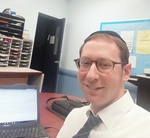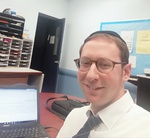
The first half of this article was published as a Letter to the Editor in the October 10 2019 Edition of The Flatbush Jewish Journal
A few months ago, I bumped into an old friend (ie: “one with whom one shares no common WhatsApp chats”). We then dutifully proceeded to inquire about one another’s lives, which at least from his end, was not completely disingenuous. I told him that in addition to teaching, which I have been doing for several years, I had recently begun doing something called “ADHD coaching.” I asked him if this was familiar to him since it isn’t to most people. He replied that it wasn’t per se, but that he knew what coaching is as well as what ADHD is so he could imagine what it would be. I thought this approach was quite clever, which is why I used this anecdote to introduce and format my article.
What is coaching, and how does it differ from therapy? This is a question I get asked a lot since my foray into the world of coaching. There are a number of distinctions. First of all, coaches are way better looking. Second, have you ever seen a therapist blow a whistle? I didn’t think so. Have you ever heard a coach say: And how does that make you feel? You’re starting to get the picture, I think.
Now, if you want actual information: Coaching is result-oriented. It’s about identifying immediate and specific goals, and then creating practical strategies to achieve them. For example, an entrepreneur may go to a coach with the goal of making more money. Someone looking to get married may seek the assistance of a coach to help them present better on dates. The approach of coaching (I know I just passed up on a cheesy rhyme there. You’re welcome.) is described as being “solution focused.” This means that coach and client collaborate to strategize and problem-solve in an actionable, concrete way. This is in contrast to therapy, in that therapy often seeks to go deeper, and address the root of the issues. Therapy explores past experiences through memory, meaning, and emotions, identifying thought processes and trauma. Through therapy clients can gain insight about why they are the way they are, and hope to grow and heal. Coaching maps out the game plan. Often therapy and coaching can be combined- one complementing the other. A client suffering from past experiences that are impacting performance at work or at home may seek the help of a coach to improve day to day function, and that of a therapist to root out and heal the trauma that created the trouble in the first place.
Another difference between coaching and therapy is that while a therapist is viewed as an expert who advises, or even guides a client, the relationship between a coach and a client is referred to as a “collaborative relationship.” This means that there is no assumption that the coach is more knowledgeable than the client per se, rather the function of the coach is to help the client organize his or her own thoughts and goals and based on this create their own strategies, customized to personality and desired outcomes.
(This was the endpoint in the Letter to the Editor.)
That was coaching in a nutshell. (How’d I do?) Now for ADHD: ADHD stands for Attention Deficit and Hyperactivity Disorder. It can be all too familiar to us from our classrooms or families, but is often misunderstood. The mention of the term “ADHD” may conjure up an image of a hyperactive little kid jumping on the couch or restlessly fidgeting in class - which is certainly part of it - but this is only a part of the whole picture. ADHD is a neurodevelopmental disorder. This means that it is a function of an irregularity in the development of the brain. The three best known symptoms of ADHD are hyperactivity, impulsivity, and erratic attention. There are, however, many other behaviors that are also functions of ADHD. These may include chronic lateness, disorganization, social challenges, and emotional dysregulation. An ADHD coach uses the coaching method to help those challenged with ADHD symptoms to create strategies for more productive and efficient day to day living. We might help a student design a routine for getting up for school on time, going to sleep on time, and/or remembering to both complete and hand in homework. We may help a student or employee devise a strategy to help them refrain from impulsively speaking their mind in a time and place in which it is inappropriate, tactless, or harmful to do so.
Avi was a fifteen year old who struggled in school due to his ADHD symptoms. Every truck that drove by caught his attention during class, as did any whispering or laughing in the classroom. Even when there were no distractions Avi had trouble paying attention. He would do his best to focus, but somehow get lost in his own thoughts. When he would return from his reverie, he was so lost that he couldn’t figure out what was happening in class. This happened often. Avi’s parents decided to try ADHD coaching for him. Together, Avi and his coach created strategies to help Avi succeed in the classroom. They discovered that Avi would be less distracted when he sat at the front of the classroom and wrote outlines of the day’s material before class. This would, of course, only be possible with the help of Avi’s rebbi. This provided an opportunity for Avi to learn the skill of advocating for himself - one he would surely need in years to come. After all, he would likely need accommodations in college and in the workplace. Having the accountability of reporting back to his coach usually ensured that Avi followed each step of his plan, though sometimes he forgot. When he did, this wasn’t a problem. Avi and his coach would then develop a plan to help him remember to do his “homework” for the following week. Within four months Avi quickly rose to the top of his class. After all, he was always very bright and everyone knew it.
Esther was an exceptionally talented graphic designer. Everyone expected her to have a promising career ahead of her when she began her first job at the age of twenty three. Esther also happened to have ADHD. Unfortunately, by the age of twenty six Esther was on her fourth job. Employers had in fact loved her creativity, and were even willing to overlook her tendency to come late to work and meetings. The problem was that she had a tendency to lose her temper. She would become offended by criticism of her work if it passed a certain threshold. When that happened, she would verbally lash out at her superiors. This cost her her job, twice. Of course, there was always something else to blame, so Esther didn’t even acknowledge this as the issue. Esther decided to try seeing an ADHD coach, mostly to work on her punctuality. During the process, Esther experienced great self discovery, finally realizing that her explosive temper was impeding her career. Esther and her coach discovered what types of situations triggered her temper and created a mindfulness regimen to help her stay in control. She also worked out an arrangement in which she would work from home on occasion. These days were timed for when she was expectinging to receive feedback. If she became upset, she would have the space and privacy to process it without others present. It took time, practice, and effort, but a year later Esther is at the same job and is a rising star in the company. Also, she comes on time to work now.
Avi and Esther are just two of the many examples of energetic young people whose ADHD symptoms were holding them back from succeeding. When clients like them avail themselves of the simple tools and skills designed to harness their strengths and rechannel their impulses, they are able to move beyond sticking points and achieve more. Coaching can also help with challenges in the home. It can help spouses and parents with ADHD reach their potential, as well as parents of young children with ADHD contain meltdowns, constant movement, and impulsive behavior. Full disclosure: I happen to be someone who does this for a living, so there is a chance I’m not only sharing this as a human interest story. I hope these fictitious cases of perfect transformation have effectively illustrated the magic of ADHD coaching, and why you or someone you know should try it.
Rabbi Shmuel Reich AAPC is an ADHD life coach in private practice in Monsey, NY (remote coaching also available) as well as a rebbi in Yeshivas Ohr Reuven in Suffern, NY. He can be reached for coaching of individuals or couples, as well as for speaking or writing engagements, at rsreichadhdcoach@gmail.com or 646-262-8257.
 Previous
Previous

